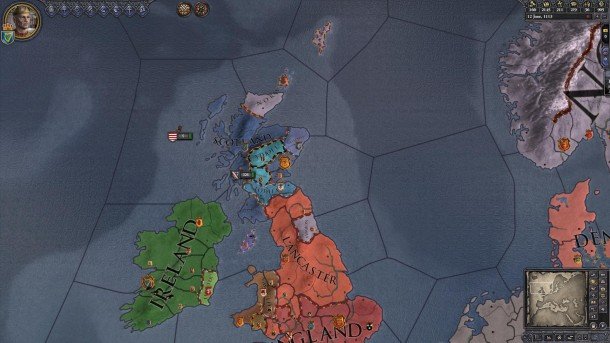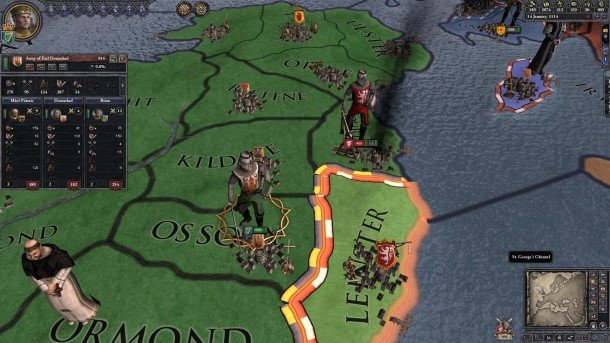
Smooth move, Oxford
May 1, 1113: The petty kingdom of Norfolk is conquered by the babe King Magnus III's regent, making the Kingdoms of England and Lancaster the only two meaningful powers in England. Norman Kent continues to hold a small fiefdom in the southeast.
June 12, 1113: Just as England is growing more unified, the long-stable Scotland fractures at the death of King Malcolm the Cruel into the realms of Galloway, Atholl, Lothian, and Strathearn.
This can only be good for me. It makes Scotland a very real option for future conquests, which was never the case before.
July 15, 1113: Gormlaith, King Brian's mistress and mother of one of his daughters, dies bedridden at 63.
September 9, 1113: Duke Åle of Oxford gets drunk and makes up some wild and ridiculous story about being involved in a plot orchestrated by King Brian and Queen Thorborg of Ireland to kill the baby King Magnus.
What, you're going to listen to that raving boozehound? Come on! Would you believe him if he told you I was part manticore and had a holiday cottage on the moon? Let's be real. By the way, remind me to never involve Duke Åle in anything important again. For reasons totally unrelated to this incident.
September 26, 1113: At 39, Máiread, the Warrior Maiden of Munster, gives birth to her only daughter, Gormlaith. Shortly after, King Brian finds that his young second wife is pregnant.
Keep up to date with the most important stories and the best deals, as picked by the PC Gamer team.
Yep, still got it.

January 1, 1114: On New Year's Day, King Brian sends a strongly-worded letter to Duke Domnall of Leinster giving him one last chance to kneel before the armies of all Ireland are sent to make him. He still stubbornly refuses, and the banners of the Kingdom of Ireland are raised for the first time.
For the first time in this entire campaign, I see no need to go all in. Could I squash him under the weight of thousands? Sure. But there's really no need to. I call the levies of the counties surrounding Leinster and come up with 816 men. Sure enough, Domnall is only able to muster about 400 rebels.
February 3, 1114: Duke Domnall is able to raise an additional 150 men, so King Brian sends word to the Duchy of Ulster. They are happy to provide another 400 to the royalists to tip the scales further.
February 23, 1114: The Battle of Dublin is the first and last meaningful battle of the Leinster Rebellion, a bloody rout that leaves only 258 of the original 550 men under Duke Domnall, with the royalists suffering minimal casualties.
Len Hafer is a freelancer and lifelong PC gamer with a specialty in strategy, RPGs, horror, and survival games. A chance encounter with Warcraft 2: Tides of Darkness changed her life forever. Today, her favorites include the grand strategy games from Paradox Interactive like Crusader Kings and Europa Universalis, and thought-provoking, story-rich RPGs like Persona 5 and Disco Elysium. She also loves history, hiking in the mountains of Colorado, and heavy metal music.

